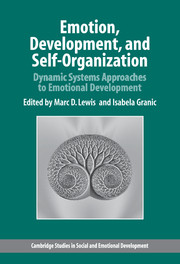Book contents
- Frontmatter
- Contents
- List of Contributors
- Foreword
- Introduction: A New Approach to the Study of Emotional Development
- Part One Intrapersonal Processes
- Part Two Neurobiological Perspectives
- 6 The Self-Organization of the Right Brain and the Neurobiology of Emotional Development
- 7 Motivation of Neural Plasticity: Neural Mechanisms in the Self-Organization of Depression
- 8 Emotion Is Essential to All Intentional Behaviors
- 9 The Neurodynamics of Emotions: An Evolutionary-Neurodevelopmental View
- Part Three Interpersonal Processes
- Commentary: The Dynamics of Emotional Development: Models, Metaphors, and Methods
- Name Index
- Subject Index
8 - Emotion Is Essential to All Intentional Behaviors
Published online by Cambridge University Press: 07 October 2009
- Frontmatter
- Contents
- List of Contributors
- Foreword
- Introduction: A New Approach to the Study of Emotional Development
- Part One Intrapersonal Processes
- Part Two Neurobiological Perspectives
- 6 The Self-Organization of the Right Brain and the Neurobiology of Emotional Development
- 7 Motivation of Neural Plasticity: Neural Mechanisms in the Self-Organization of Depression
- 8 Emotion Is Essential to All Intentional Behaviors
- 9 The Neurodynamics of Emotions: An Evolutionary-Neurodevelopmental View
- Part Three Interpersonal Processes
- Commentary: The Dynamics of Emotional Development: Models, Metaphors, and Methods
- Name Index
- Subject Index
Summary
Introduction
The problem of understanding emotion has emerged as one of the major challenges for the social, psychological, and psychiatric disciplines. The root of the problem goes very far back in the history of Western science and philosophy, whence came the primary assumptions that people of European origin use to explain the nature of mind, and how the mind relates to the body and to the world through learning. A singular clue to the form of one of these assumptions is provided by the distinction often made between emotion and reason. This is a “commonsense” notion used to explain the motives of observed behaviors. Motives are reasons that explain the actions we witness with respect to the state of mind of the perpetrators. In this philosophical interpretation, actions stem either from reasoned judgments of available options in the light of self-interest or the greater good, or they are based in an internal force that is out of conscious control and beyond rational choice – blind emotion.
An alternative view, one that I will elaborate here, holds that because this dichotomy treats emotion as bad and reason as good, it fails to recognize them as properties of a larger whole. All actions are emotional, and at the same time they have their reasons and explanations. This is the nature of intentional behavior.
- Type
- Chapter
- Information
- Emotion, Development, and Self-OrganizationDynamic Systems Approaches to Emotional Development, pp. 209 - 235Publisher: Cambridge University PressPrint publication year: 2000
- 49
- Cited by

